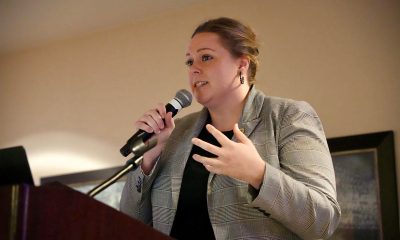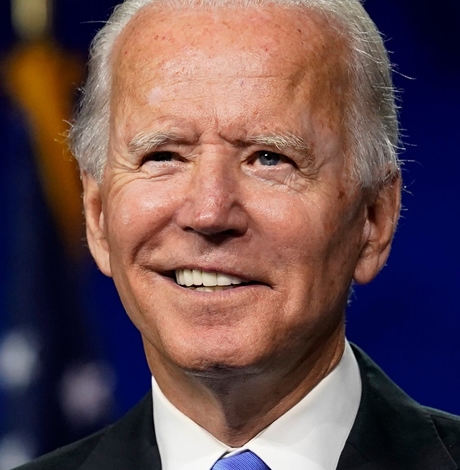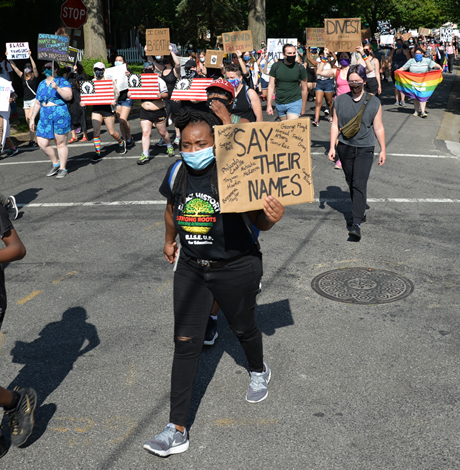National
U.S. agency seeks to cut LGBTQ protections in union contract talks
NLRB denies meeting with employees concern about anti-LGBTQ move
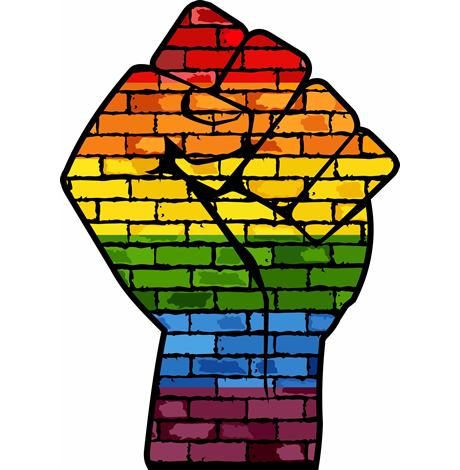
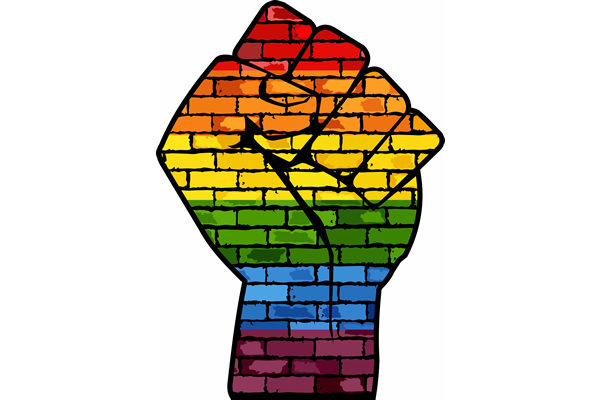
The National Labor Relations Board is seeking under the Trump administration to axe LGBTQ non-discrimination language — as well as protections based on race, sex and religion — from its union contract with professional attorneys within the U.S. agency as part of collective-bargaining negotiations, according to union representatives.
The union, known as the National Labor Relations Board Professional Association, is made up of about 120 attorneys at the NLRB headquarters in D.C.
“They’re taking it all out,” one NLRBPA member said. “They’re basically saying it’s duplicative, it’s covered by statute, so we don’t want to do anything through grievance and arbitration. If you think there is discrimination, then you need to a file complaint with the EEOC.”
The NLRBPA is pleading with Rep. Jamie Raskin (D-Md.) and Sen. Dianne Feinstein (D-Calif.) to step in and urge the agency to keep those non-discrimination protections in place within the union contract. Individually, LGBTQ employees with concerns over removal of the non-discrimination protections also sought to meet with management on the issue, but were rebuffed, union members told the Washington Blade.
For the time being, NLRB is required to maintain the non-discrimination protections from the previous contract, even though that contract expired last year. But that situation is expected to change soon. As a result of executive orders signed by President Trump last year, federal employee unions are required to engage in negotiations with their respective agencies to form new contracts.
In a pair of letters dated March 5, the NLRPA calls on Raskin and Feinstein to engage in oversight of the agency as it seeks to eliminate those non-discrimination protections. One letter calls the proposal “a giant step backward in the fight to ensure that LGBTQ workers receive equal treatment under the law.”
“It is a mark of shame that employment discrimination against LGBTQ employees, including federal employees, has been tolerated for so long, and to callously take any protections away after so long a struggle for equal treatment would be unconscionable,” one letter says. “In that spirit, we would be most grateful for any oversight of the agency and help that you can provide to defend the workplace rights of our LGBTQ brothers and sisters.”
The letters also express other concerns. Among them is NLRB proposing to eliminate a standing joint labor-management Equal Employment Opportunity Committee, a reversal the union says turns “historically a cooperative relationship between management and the union into an adversarial relationship.” The NLRB also proposes to undercut the grievance and arbitration system in other ways, the letter says.
Raskin, in a statement to the Blade responding to the letter, said NLRB’s proposed removal of LGBTQ protections is unjust, especially from a U.S. agency charged with enforcing federal labor law.
“Trump’s administration has tried from the start to purge all mention of LGBTQ rights from federal law and policy,” Raskin said. “Now, by proposing to eliminate protections for LGBTQ employees from its collective bargaining agreements, the NLRB — which is supposed to be a leader for workplace fairness—becomes the latest perpetrator of the administration’s political assault on equal protection and equal employment rights for the LGBTQ community.”
NLRB, according to members of the union, justified its proposed removal of the non-discrimination protections on the basis that employees could seek recourse against discrimination under Title VII of the Civil Rights Act of 1964, a federal law that bars discrimination on the basis of race, color, religion, sex and national origin.
But that law as it stands affords no protections based on sexual orientation or gender identity. Although the U.S. Supreme Court is considering litigation that will decide whether anti-LGBTQ discrimination is a form of sex discrimination, thus illegal under Title VII, there is no certainty that will happen.
Should the Supreme Court rule Title VII doesn’t cover anti-LGBTQ discrimination, NLRBPA attorneys would have no recourse under federal law for LGBTQ discrimination claims.
NLRBPA employees — even though they work within D.C. — also aren’t covered by the D.C. Human Rights Act. Although the law bars anti-LGBTQ discrimination, the D.C. Human Rights Act doesn’t have jurisdiction over federal entities, such as NLRB.
Over the course of contract negotiations, one NLRBPA member said, management was unmoved by the argument LGBTQ non-discrimination protections are needed in the union contract because the Supreme Court might be against them under Title VII.
“There’s a possibility we’re not going to be covered by statute, so we will have no protections whatsoever,” the NLRBPA members said. “And my understanding was the agency response was, ‘We can’t control what the Supreme Court does.”
According to the NLRBPA, non-discrimination protections based on sexual orientation have been part of the NLRBPA contract since 2002 and non-discrimination protections based on gender identity have been part of the contract since 2017. Although that contract was terminated in 2019, the agency remains legally obligated to enforce it until a new contract agreement with the union is reached.
“So you can imagine our dismay when we received contract proposals from management eliminating the contractual provisions prohibiting discrimination based on sexual orientation and stating that any ‘prior MOUs, agreements, or settlements executed prior to the latest date below are not incorporated into this agreement,’” the letters say.
Outside of union negotiations, the letter says, a group of LGBTQ employees sought to meet with senior management to discuss concerns over the removal of the non-discrimination language, but were unsuccessful.
Adam Naill, an NLRB attorney and NLRB union official, affirmed to the Blade via email a group of LGBTQ employees were denied a meeting with management outside the negotiations.
“A number of LGBTQ folks at the agency attempted to meet with NLRB senior leadership to just express their concerns about the proposal and how they’re feeling — frightened and alarmed — about management’s position on this and were rebuffed, senior leadership said they wouldn’t meet with employees about the issue,” Naill said.
The NLRB justified denying the meeting, one NLRBPA member said, by giving assurances the agency is committed to LGBTQ equality and saying the meeting would be inappropriate amid ongoing contract negotiations.
But the NLRBPA member expressed doubt about that commitment to LGBTQ equality based on attorneys in the workforce overheard making homophobic statements.
“Among some of the rank and file attorneys, those people who very likely in the coming years will probably be promoted to supervisors, there’s been several times overhearing some very problematic homophobic, misogynist statements coming from them,” the NLRBPA member said.
The office of Feinstein didn’t respond Monday to the Blade’s request to comment on the proposed removal of LGBTQ protections. The NLRB declined to comment for this article, citing a practice of withholding commenting on contract negotiations with unions.
Jerame Davis, executive director of the LGBTQ labor group Pride at Work, condemned NLRB in a statement to the Blade, but said this move is consistent with the policy of the Trump administration.
“As taxpayers, we should expect that all working people — including LGBTQ working people — would be protected from discrimination in a federal government job,” Davis said. “But it is particularly insulting that these protections are being stripped from the working people who protect our country’s workforce from unfair labor practices. There is little that has been consistent with this administration, but their attacks on LGBTQ people have come regularly, like clockwork.”
The union for the professional attorneys at NLRB is different from the union for the 1,200 employees in the field offices, which is the known simply as the National Labor Relations Board Union, or NLRBU.
According to NLRBPA, the sister union is also currently engaged in contract negotiations, but they’re still bargaining over ground rules and haven’t made substantive proposals. The Blade emailed NLRBU seeking a comment on the situation.
NLRB chair John Ring and NLRB general counsel Peter Robb are set to testify on Wednesday before the House Appropriations Committee on the Trump administration’s budget request. It remains to be seen whether the agency officials will be questioned on the proposed non-discrimination omission from the union contract.
New York
N.Y. lawmaker vows ‘Pride flag will fly again’ at Stonewall Monument
After a Jan. 21 policy shift, Pride flags were banned at national parks, prompting backlash from Bottcher and LGBTQ advocates.

Hours after news broke that the National Park Service would no longer allow Pride flags to fly at the Stonewall National Monument — the birthplace of the modern LGBTQ rights movement in the United States — the Washington Blade spoke with New York State Sen. Erik Bottcher, who represents the area surrounding the Stonewall Inn and the national monument.
During the interview, Bottcher, who is gay, spoke about the policy change and outlined steps he plans to take in the coming days to push for its reversal.
“This is another act of erasure,” Bottcher told the Blade. “It’s a cowardly attempt to rewrite history and to intimidate our community. This is Stonewall — it’s where we fought back, where we ignited a global movement for equality — and we refuse to go back. We’re not going to accept these acts of erasure.”
The Stonewall Inn became a flashpoint in 1969 after NYPD officers raided the bar, part of a longstanding pattern of police harassment of LGBTQ spaces. The raid sparked days of protest and resistance along Christopher Street, now widely recognized as the catalyst for the modern LGBTQ rights movement.
While the events are often referred to as the “Stonewall Riots,” many activists and historians prefer the term “Stonewall Uprising,” emphasizing that the resistance was a response to systemic oppression rather than senseless violence. LGBTQ patrons and community members fought back — shouting “Gay Power!” and “Liberate Christopher Street!” — as crowds grew and frustration with police abuse boiled over.
Since the uprising, LGBTQ people and allies have gathered annually in June to commemorate Stonewall and to celebrate Pride, honoring the movement that placed LGBTQ voices at the center of the fight for equality.
In June 2016, then President Barack Obama officially designated the space as the Stonewall National Monument, making it the United States’s first national monument designated for an LGBTQ historic site.
Now, nearly 10 years later, President Trump’s appointed NPS acting director Jessica Bowron changed policy on Jan. 21 regarding which flags are allowed to be flown in national parks. Many, including Bottcher, say this is part of a larger targeted and deliberate attempt by the administration to erase LGBTQ history.
“It’s clear they’re making a conscious decision to erase the symbols of our community from a monument to our community’s struggle,” he said. “This is a calculated and premeditated decision, and it could be — and should be — reversed.”
“Let’s be clear,” Bottcher added, “they wish we didn’t exist … But we’re not going anywhere. We refuse to go back into the shadows.”
When asked why it is critical to challenge the policy, Bottcher emphasized the importance of visibility in preserving LGBTQ history.
“This is why it’s so important that we not let this stand,” he said. “Visibility is critical. When people see us, learn about us, and get to know us, that’s how we break down prejudice and stereotypes. We cannot allow them to push us back into the shadows.”
Other LGBTQ leaders and elected officials were quick to condemn the removal of the Pride flag, which had flown since the site’s official designation as a national monument.
New York City Mayor Zohran Mamdani called the decision “outrageous.”
“I am outraged by the removal of the Rainbow Pride Flag from Stonewall National Monument,” Mamdani said in a statement. “New York is the birthplace of the modern LGBTQ+ rights movement, and no act of erasure will ever change or silence that history.”
“Our city has a duty not just to honor this legacy, but to live up to it,” he added. “I will always fight for a New York City that invests in our LGBTQ+ community, defends their dignity, and protects every one of our neighbors — without exception.”
Senate Minority Leader Chuck Schumer also condemned the move.
“The removal of the Pride Rainbow Flag from the Stonewall National Monument is a deeply outrageous action that must be reversed immediately,” Schumer said in a statement to The Advocate. “Stonewall is a landmark because it is the birthplace of the modern LGBTQ rights movement, and symbols of that legacy belong there by both history and principle.”
Cathy Renna, communications director for the National LGBTQ Task Force, said the flag’s removal will not erase the movement it represents.
“They can take down a flag, but they can’t take down our history,” Renna said. “Stonewall is sacred ground rooted in resistance, liberation, and the legacy of trans and queer trailblazers who changed the course of history.”
Human Rights Campaign National Press Secretary Brandon Wolf echoed that sentiment.
“Bad news for the Trump administration: these colors don’t run,” Wolf said. “The Stonewall Inn and Visitors Center are privately owned, their flags are still flying high, and that community is just as queer today as it was yesterday.”
Tyler Hack, executive director of the Christopher Street Project, said the removal was aimed squarely at LGBTQ visibility.
“The Pride flag was removed from Stonewall for one reason: to further erase queer and trans people from public life,” Hack said. “Stonewall marks the moment when queer and trans people fought back and demanded dignity. Our history is not theirs to erase.”
Bottcher closed with a promise to his constituents — and to the broader LGBTQ community — that the Pride flag’s removal would not be permanent.
“We will not be erased. We will not be silenced,” he said. “And the Pride flag will fly again at the birthplace of our movement.”
Florida
Disney’s Gay Days ‘has not been canceled’ despite political challenges
GayDays is moving forward with its planned LGBTQ meet-up

Gay Days in Orlando is preparing for its 2026 gathering though organizers have yet to release full details.
Concerns emerged about the status of the annual meetup of LGBTQ people at Walt Disney World in Orlando, Fla., after social media posts and multiple news outlets reported the event would not take place this year.
In response to inquiries from the Blade, Josh Duke, co-owner of Gay Days, clarified that an update would come this week.
“At this time, I’d like to clarify that Gay Days Orlando has not been canceled,” an email to the Blade said. “We are currently finalizing details regarding our plans for 2026 and will be making an official announcement later this week.”
Earlier this week, Gay Days posted about a pause in their plans for the annual meeting, which quickly gained traction online.
In an official statement on social media, Gay Days organizers cited several factors behind what had initially appeared to be a cancellation of their 2026 event.
“Changes to our host hotel agreement, the loss of key sponsorship support, and broader challenges currently impacting LGBTQIA+ events nationwide made it impossible to deliver the experience our community deserves,” organizers wrote. However, the statement added, “This is a pause — not an ending.”
In a longer message shared with supporters, organizers elaborated on that now-reversed decision.
“Gay Days Family — it is with very heavy hearts that we share Gay Days 2026 will not take place this year. This was an incredibly difficult decision and one that was only made after every possible option was explored.
“Gay Days has always been more than an event — it is community, family, and a place where so many memories are made. While this pause is painful, it also gives us the opportunity to step back, listen, and begin shaping a stronger and reimagined GayDays for the future. Thank you for your continued love, patience, and support. This is not goodbye — it’s a reset, and we look forward to creating the future of GayDays together.”
GayDays, which began in 1991, encourages queer Disney fans to visit the Orlando theme park while wearing red shirts to identify one another. Originally focused on gay men reclaiming the childhood joy often denied due to homophobia, the event has expanded over the years to include LGBTQ+ families on summer vacations and queer couples honeymooning in the Magic Kingdom.
Disney made history in 2019 by holding its first-ever official Pride event at its European park, Disneyland Paris. In 2023, Disneyland California hosted the first U.S. official Pride event.
Concerns about the potential cancellation had arisen amid broader challenges affecting LGBTQ events nationwide. These include changes in hotel agreements, sponsorship support, and Florida’s increasingly restrictive anti-LGBTQ policies under Gov. Ron DeSantis. Florida currently has an equality score of -3.00 out of 49 from the Movement Advancement Project, which evaluates states based on policies affecting relationship and parental recognition, nondiscrimination, religious exemptions, LGBTQ youth, healthcare, criminal justice, and transgender identity documentation.
Recent legislation in Florida has included prohibitions on hormone replacement therapy for transgender minors, restrictions on adult access to treatment, bans on drag performances for those under 18, bathroom bans for transgender people in state buildings, and expansion of the Parental Rights in Education Act, commonly called the “Don’t Say Gay” law. These measures limit public school instruction or discussion about sexual orientation and gender identity.
Gay Days Anaheim is scheduled to take place at Disneyland Resort in September.
Disney has also maintained a focus on Pride, reporting in 2022 that proceeds from Pride merchandise benefited numerous LGBTQ organizations, including GLSEN, PFLAG, The Trevor Project, Zebra Coalition, the Los Angeles LGBT Center, the LGBT Center Orange County, the San Francisco LGBT Center, and the Ali Forney Center. Pride merchandise sold internationally supports local LGBTQ organizations in those regions.
More details about this event are expected to be released on Friday.
New York
Pride flag removed from Stonewall Monument as Trump targets LGBTQ landmarks
The new NPS policy targets Pride flags amid consistent efforts from the Trump administration to minimize LGBTQ history.

A rainbow Pride flag flying at the Stonewall National Monument in New York was removed at the direction of Trump administration officials at the National Park Service, according to a source familiar with the matter who spoke to the Blade on condition of anonymity.
The source said the move had been in the works for weeks and is part of ongoing efforts by the Trump-Vance administration to erase LGBTQ identity from federally controlled landmarks.
In response to the Blade’s request for information about the new flag policy, the National Park Service provided the following statement:
“Current Department of the Interior policy provides that the National Park Service may only fly the U.S. flag, Department of the Interior flags, and the Prisoner of War/Missing in Action flag on flagpoles and public display points. The policy allows limited exceptions, permitting non-agency flags when they serve an official purpose. These include historical context or reenactments, current military branch flags, flags of federally recognized tribal nations affiliated with a park, flags at sites co-managed with other federal, state, or municipal partners, flags required for international park designations, and flags displayed under agreements with U.S. Citizenship and Immigration Services for Naturalization ceremonies.”
The statement also included official guidance on the display of non-agency flags issued by Trump-appointed National Park Service Director Jessica Bowron.
The Blade reached out to other organizations to confirm the status of the Pride flag last week, including the Stonewall National Monument Visitor Center, the NYC Landmarks Preservation Commission, and the National Parks Conservation Association. None were able to provide details about whether the flag was still flying at that time but it has since been removed.
This action aligns with other moves targeting and erasing LGBTQ history. In September, the Blade reported that three organizations originally slated to receive more than $1.25 million from the National Park Service’s Underrepresented Communities Grant Program would no longer receive funding: In Washington, D.C., the Preservation League had been awarded $75,000 to document LGBTQ+ historic resources. In Providence, R.I., the Preservation Society was slated for $74,692 to conduct an LGBTQ+ survey and prepare a National Register nomination. And in New York, the Fund for the City of New York, Inc., had been awarded $32,000 to nominate the residence of Bayard Rustin — the iconic civil rights and LGBTQ activist — as a National Historic Landmark.

